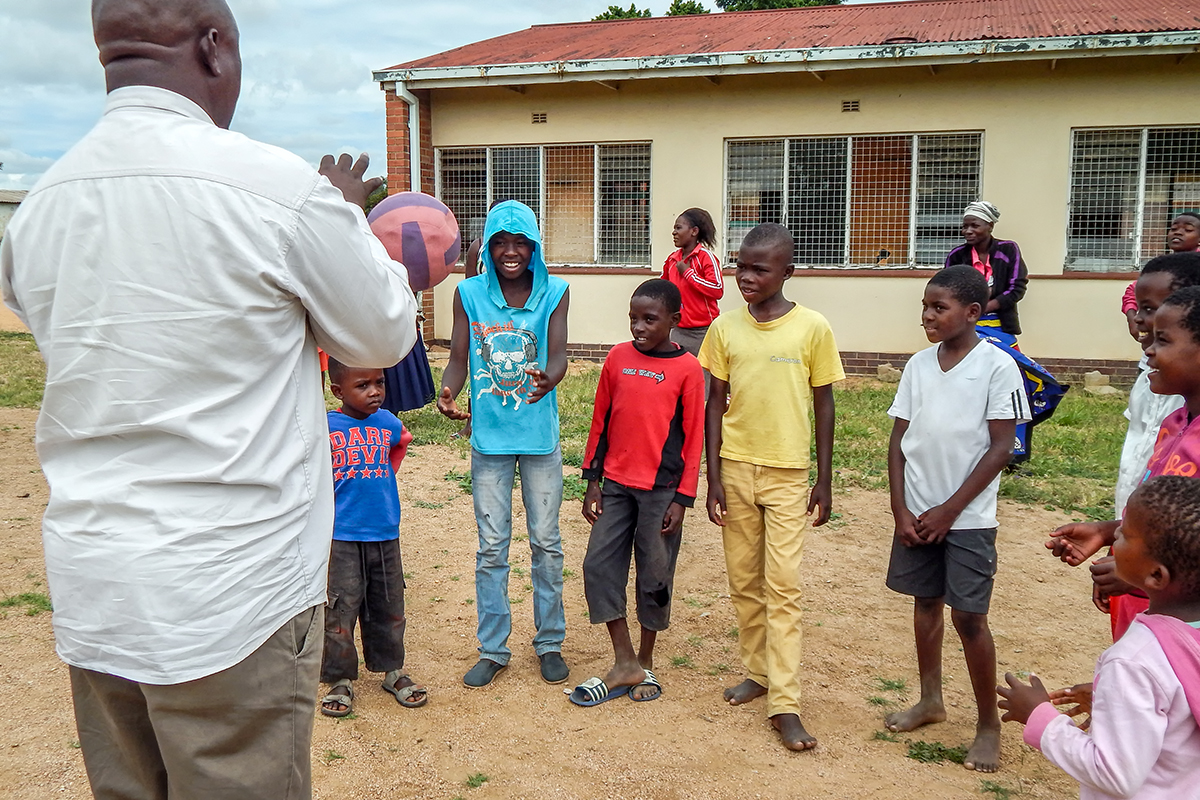
Fortune Moyo, GPJ Zimbabwe
A volunteer with Cacile Trust plays football with some of the boys who receive counseling from the nonprofit, in Njube, a suburb of Bulawayo. The nonprofit was set up to support boys and men who have experienced physical, sexual and emotional abuse, among other challenges.
BULAWAYO, ZIMBABWE – Gender-based violence is common in Zimbabwe, says 41-year-old Roy Ndlovu.
“When a woman or girl is abused, it gets everyone’s attention,” says the founder of Cacile Trust, a nonprofit based in Bulawayo, Zimbabwe’s second-largest city. “But when it is a boy or a man, it becomes a laughing matter.”
Ndlovu, a part-time lecturer at Zimbabwe Open University, founded Cacile Trust in 2015 to serve men and boys who have experienced violence or abuse from partners, family members or acquaintances. Cacile Trust provides free psychological support and resources for the men to start small businesses to support themselves.
While gender-based violence against women and girls is declining in some parts of the country, thanks to research, legislation, national policies and growing accessibility to psychological treatment, such violence against men persists. But few men report cases of violence and abuse to authorities because of stigma and lack of awareness, advocates say.



There is little funding for initiatives to end violence against men, and minimal research exists on the issue, advocates say.
Physical, emotional, psychological and sexual abuse between spouses is prevalent in Zimbabwe, local experts say. In rural parts of the country, 19 percent of men say their spouses are physically violent toward them, according a 2017 report from the Zimbabwe Vulnerability Assessment Committee. Across the country, young men are targets of sexual violence, too.
In a 2011 survey conducted by the Zimbabwe National Statistics Agency, an estimated 11.2 percent of men age 18 to 24 say they have experienced various forms of sexual violence, including forced sex, before the age of 18.
While the law criminalizes sexual assault against men with a term of up to life in prison, it also defines rape as an act that can only be committed by a man. Eighty-four percent of male respondents in a 2013 survey conducted by the Research and Advocacy Unit, a local nonprofit, acknowledged that Zimbabwean men are at risk of rape.
The country’s legal definition of rape discourages men from informing authorities when they are raped, but so does stigma, says Skhathele Matambo, a social expert and founder of a local nonprofit that supports women. Exaggerated masculinity is entrenched in Zimbabwean culture and tradition, she says.
“Once they report such cases, they are viewed as weak,” Matambo says of men who are sexually abused.
Buhlebemvelo Nkomo, one of four volunteers at Cacile Trust, says the organization is currently providing services to 16 men and boys, one as young as 8, who have been referred by friends and family. Free counseling is available to the males, as well as to their family members and partners, for as long as they need it, he says.
Mpala, a Bulawayo resident who requested that only his last name be used for fear of being stigmatized in his community, turned to Ndlovu’s organization after years of being physically abused by his partner.
Mpala, who says he found out about Cacile Trust from a friend, received counseling from Ndlovu twice a week for a month. He says members of the organization also assisted him in setting up a small business.
“It is not easy as men to talk of cases of abuse, but I am one of the men who was being abused by my partner,” Mpala says. “Cacile has greatly assisted me in dealing with this challenge, and as we speak, my partner and I are working things out.”
For 17-year-old Mxo, who was sexually and emotionally abused by his uncle since he was 14, he says sharing his experience with Ndlovu and receiving counseling helped to put an end to the abuse.
“During the abuse, I did not know who to talk to,” says the fruit and vegetable vendor who requested that only his first name be used for fear of being stigmatized. Mxo says his mother attended the counseling sessions with him for three months, after which they reported the abuse to authorities. Mxo’s uncle was arrested, but he was released on bail. The uncle is no longer living with Mxo and his mother.
Despite some successes, Nkomo says the work can be challenging. Globally, initiatives to end violence against women and girls are well-funded. The United Nations awarded a total of $129 million to 463 initiatives across 139 countries and territories, including Zimbabwe, in 2017.
But funding for research and initiatives to support men who experience violence is limited, says Siphiwe Phiri, a volunteer administrator at the nonprofit currently funded by Ndlovu.
Fortune Moyo, GPJ, translated some of the interviews from isiNdebele.







